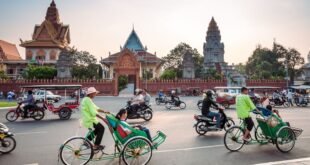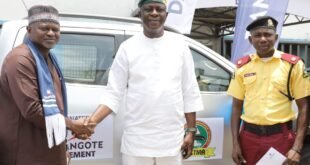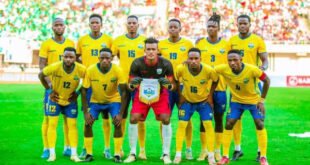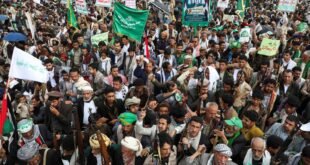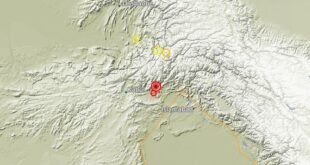Since democracy was restored in Nigeria in 1999, each administration has undertaken a research to obtain what they describe as a “popular constitution”.
And just like its predecessors, the current tenth national assembly has started the umpteenth round of zonal public auditions as part of its now familiar exercise of constitutional revision. But the question that every Nigerian should face is simple: who really benefits from what has become a ritual every legislative cycle?
Since 1999, the issues that have been discussed for the constitutional revision have remained constant. Questions such as political renovation, electoral reforms, resources control, true federalism, the devolution of power and the re-Juigging of security architecture in the form of a state police.
First of all, let me be clear: I do not have a dispute with the idea of reviewing or modifying our Constitution. After all, the construction of the nation is an ongoing job. He never finished or sacrosanct. However, what I quarrel with – which should disturb each Nigerian – is the industry that has been built around it. Just like those who have transformed the electoral reforms into a company that resurfaces each electoral cycle, some have transformed the constitutional revision into a guaranteed company every legislative cycle.
It is therefore my hope that this speech can arouse deeper reflections and allow us to suggest other ways that help solve this problem.
Whenever a constitutional revision is discussed, a constant excuse is that legislators must aggregate the wishes of the Nigerians of every social class through zonal public hearings, collect memorancies from various groups of interest throughout the country, as well as undertaking a progressive commitment with state governments and laws and the federal government to achieve the consensus on all problems.
However, what is rarely discussed is the cost of these projects and what the Nigerians get in return. What was our return to investments. Each regime of the National Assembly has launched a new amendment project of the Constitution for which some billion N4 is approved, to be appropriate and released on the basis of n1 billion per year. This is added to some extra funds issued to the Committee for any unexpected expenses.
Nobody talks about the fact that the closing of N26.8 billion was spent by the Senate and the Chamber of Representatives in this perennial exercise. And what were the results?
The sad truth is that these reviews have not largely managed to face the deepest structural, political and governance problems that the Nigerians worry more. Yes, under the ninth assembly, we obtained the not too young to manage, early funding for the Incen and financial autonomy for state legislatures and judicial. But ask yourself: with all the billions spent, what was the real impact on the governance and life of the Nigerian normal?
The truth can be uncomfortable: the key reforms continue to fail. Some of the most critical and widely requested reforms – such as the State Police, the autonomy of the local government, the electoral reforms that strengthen the Incen and the clearer procedures for the creation of new states – have repeatedly failed, usually blocked by state assemblies, acquired interests or elite political calculations. But of course, we must return another four years later to keep public auditions on the same old problems.
In addition to the constitutional review, the electoral reforms have become another consummate excuse that predictably resurfaces every election season. Like the clockwork, while each electoral approach, the committees are established, public auditions are announced and Memorandum are collected – all under the banner to “fix the electoral process.
The public hearings for the constitutional amendment have evolved silently in a sector in its own right: an elaborate show that consumes enormous resources, but often providing little more than promises and news titles.
Is my concern happened to the opinions aggregated during zonal public auditions in the eighth assembly and in the ninth assembly? Have the problems changed in such a dramatic way that we have to spend billions to “listen to them”?
And why do we need new auditions to discuss issues such as state creation when the Constitution already clearly exposes the process for state creation? If the legal requirements are met, nobody can stop it. Yet the topic continues to return, because keeping the “constitutional reform sector” lives some interests. This is my theory.
Is it really a coincidence that almost all the vice president of the Senate or vice -president who presided over these constitutional revision committees have worked for the governor’s office? EMEKA IHEDIOHA. Ike Ekweremad. Oomo-Agege sheep. And now, the current vice -president Benjamin Kalu is following the same path. Shouldn’t we at least admit what is obvious?
In addition, who are the consultants hired to draw up the memorandum and facilitate zonal meetings? Have there ever been competitive offers? Has the National Assembly advertised these contracts? How many funds have contributed to these auditions? The details remain hidden, far from the eyes of the people
It’s time to ask uncomfortable questions. We pretend that these auditions concern democracy and inclusion, but the reality is that they have become comfortable budget lines, annual discussion points and photographic opportunities.
Instead of legislators who carry out real work through their electoral offices – who, in principle, should work as mini public audience centers – we collect crazy at the hotel, announce zonal consultations and repeat the same debates every four years.
We must face the truth: if the 360 members of Nigeria and 109 senators really had offices of active and involved electoral colleges, these repeated national hearings would be redundant. The infinite rounds of public hearings are, in many ways, an accusation of disconnecting the legislators by the same people who claim to represent.
Did we have public auditions during the eighth assembly? YES. The ninth assembly? Once again, yes. Have basic problems changed? Hardly. So when will we admit that something deeper beyond the real reform is guiding this cycle?
It is time to stop transforming the constitutional revision into a permanent campaign, a spinner of money and a ritual that enriches some sold out while exhausting the patience of all the others. The Nigerians deserve a real reform, not an industry of infinite auditions.
Eleven years after about 500 delegates, taken from all parties of the country and representing different interests, they concluded a five -month resolution on the political system and the future of Nigeria, where they approved more than 600 resolutions and produced a report of 10,335 pages, which was presented to the former president Goodluck Jonathan for implementation
What happened to that relationship. A decade after this report has been presented, it is still collecting dust in the government archives. Each administration had promised to review this relationship.
The problem of Nigeria is not the absence of laws or recommendations. The problem is political will. To modify any section of the Constitution, 24 out of 36 assembly houses must approve the account with a majority of two thirds. Yet in the last round, only 11 states have respected some recommended sections for the modification, despite all the billions spent.
With the current difficulty in front of the Nigerians, he thinks for a moment of the difference that those billions could make: schools, hospitals, clean water and safety. While billions disappear in conferences and consultations, millions of Nigerians struggle to afford food, medicine or school fees.
So what should change?
As I said before, the essence of this speech is not complaining but arousing deeper reflections.
For me, it starts honestly. We must tell ourselves the truth at home admitting that we cannot continue to pay billions in hearings that produce nothing but fresh frustration. Legislators must demonstrate their commitment by transforming the offices of the electoral college into real citizens’ involvement centers: where the real voices are listened to daily, not only every four years. The Nigerians must request transparency: who has been paid, how much and for what?
Above all, we must remember that no constitution, no matter how perfect on paper, can save a country whose leaders do not have the courage to do what is right. The real reform will never come from annual rituals and hotel meetings; It will only come when the political class puts the nation above the ambition and service above itself.
Ezenwa Nwagwu is executive director, peering Advocacy and Advancement Center in Africa (Paca)
 JamzNG Latest News, Gist, Entertainment in Nigeria
JamzNG Latest News, Gist, Entertainment in Nigeria

